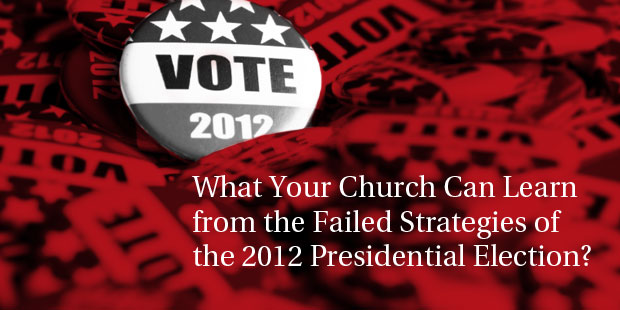
What Your Church Can Learn from the Failed Strategies of the 2012 Presidential Election
It’s a tricky thing to engage in political analysis before the dust has fully settled on a recent election. No doubt pollsters, pundits, and politicians from both sides of the aisle will be examining the 2012 election in the coming weeks and months.
Republican strategists will perform a post-mortem on the Romney campaign and the Senate seats that slipped away. Most will wonder about the failure of Republicans to seize the advantage during an ongoing recession and take the reins away from an unpopular president.
Despite the risks of weighing in too early, I thought it would be worth pointing out a few things the evangelical church could learn from the losses of the Republican Party this year. Let me be clear at the outset that I am not equating the two. A political party only has life as long as people find it valuable. The church is guaranteed a future because of Christ’s promise as Master Builder.
Still, there are a number of lessons that evangelicals can learn from failed strategies in the political arena. Here are a few I jotted down while watching the election returns.
1. We cannot afford to ignore changing demographics.
Much of the chatter on election night centered on the increasing racial and ethnic diversity in a number of states traditionally viewed as “safe” for Republicans. The story was similar in Colorado, Florida, and Ohio.
The days when the “male white voter” dominated elections are over, which explains why Romney was able to maintain a substantial lead among white men and still lose the election. When your target is a shrinking number of people and your strategy is to keep them on board by alienating the rising urban ethnic groups (by, let’s say, failing to come up with a sensible immigration plan), it’s no wonder you lose elections.
Surveying the crowd at Romney’s headquarters, I saw a sea of white. Obama’s gathering was a microcosm of the diverse country we live in.
How does this translate to the church? Simple. If you are seeking to be a missionary presence in your community, you can’t ignore demographics.
For example, if your church is an upper-class, predominantly white congregation in a city that is no longer upper-class or predominantly white, then you’ve got a problem. And unfortunately, this problem exists all over the country.
When the community changes colors, churches tend to go into auto-pilot mode with the silent expectation that outsiders should conform to the church’s culture. In the end, we don’t model the coming kingdom or the current community. We develop a “fortress mentality” where a way of life is maintained instead of a “missional mentality” where missionary strategies are employed, strategies that actively seek to reflect the diversity in the community by reaching the lost outside their doors.
2. We can’t ignore facts that make us uncomfortable.
It was interesting to watch how many conservative pundits and politicians were convinced up to the end that Romney would win by a landslide. The talking heads on television were divided down partisan lines, with Republicans predicting Romney would either squeak by or win big and Democrats assuring everyone that Obama would survive. The polls were analyzed, reinterpreted, and refashioned in order to give hope to both campaigns.
Churches can sometimes make the same mistake. We see incremental growth here and there, so we choose to look at the results that encourage us. We avoid the truth that may confront us and make us uncomfortable. To maintain a positive vibe in the congregation, we celebrate small victories and overestimate their importance while at the same time ignoring reality when it presses us to reevaluate our methods or ideas.
A good leader will paint a picture of reality, however disconcerting it may be. It’s only when we see where we truly are that we get motivated with a sense of urgency to complete the tasks God has given us.
3. Political campaigns remind us of the kingdom whose foundation cannot be shaken.
Wins and losses in the political realm each have their lessons. When your preferred candidate wins, it’s easy to pin great hopes on their campaign, to overlook flaws and excuse wrong behavior. When your preferred candidate loses, it’s tempting to wonder if political involvement really matters.
The Christian gets the opportunity every election season to keep things in perspective. Through wins, we temper our expectations regarding the change that any one man can affect, no matter how promising. Through losses, we continue to maintain a faithful presence in obedience to the King who is not up for reelection.
So why get involved in politics anyway? Because elections matter. Ideas have consequences. We are called to live justly and humbly for the glory of God and the good of our neighbors.
But the changing tides of political and public opinion remind us of the steadfast, unmovable kingdom we belong to. We engage, not because it’s popular or because we absolutely must win, but because we are God’s kingdom people, living on earth as citizens of heaven.

Tags: Kingdom Concept, Trevin Wax, Vision Frame












